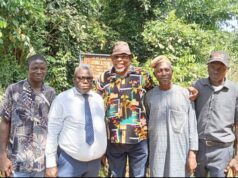By Editor
The Al-Habibiyyah Islamic Society (AIS) has urged Nigerians to embrace ethical philanthropy as a pathway to addressing the country’s socio-economic challenges and deepening national development.
The National Chief Imam of AIS, Sheikh Fuad Adeyemi, made the call in Abuja at a news conference to commemorate the 2025 National Philanthropy Day under the Faith and Philanthropy Initiative of the organisation.
According to him, the theme “Giving with Purpose: Philanthropy Through a Faith Lens”, reflects the AIS’s belief that philanthropy must go beyond financial donations to include meaningful connections, measurable impact, and shared prosperity.
”The theme reflects a principle deeply rooted in Al-Habibiyyah’s mission that true philanthropy goes beyond giving money.
”It is about giving meaning to lives, building genuine human connections and ensuring that every act of kindness leads to lasting change and shared prosperity,” Adeyemi said.
The Muslim cleric said the engagements revealed that Nigerians were naturally generous but sought assurance that their contributions would be applied responsibly for visible impact.
He said the Faith and Philanthropy Initiative brought together Muslim and Christian leaders, civil society groups, and development partners to explore how faith-driven giving could help tackle poverty, unemployment, and educational inequality.
He also said the society had undertaken study tours in Turkey and Malaysia to understudy effective global philanthropic models, adding that another tour would soon be held in Morocco, to strengthen its impact strategies.
”Philanthropy should be seen as a strategic investment in human capital and a complementary tool for economic growth in support of government efforts in education, healthcare, environmental sustainability, and social welfare,” Adeyemi said.
He urged the Federal Government to officially designate November 15, as National Philanthropy Day, as done in Canada, Mexico, Puerto Rico, and the United States, to institutionalise ethical giving as a national value.
He called for the creation of an Office of Religious Affairs to coordinate faith-based initiatives, promote interfaith collaboration, and enhance the role of religious platforms in sustainable development in the country.
According to him, philanthropy must become a sustained national lifestyle rooted in empathy, integrity, and collective purpose.
He also urged the private sector to broaden its support beyond the entertainment industry by investing in interfaith programmes that promote unity, inclusivity, and social cohesion.
He said, “If every Nigerian gives with purpose and heart, guided by ethical principles and clear goals, we can lift millions out of poverty, build resilient communities, and accelerate development in line with the SDGs.”
Discover more from TheTimes Nigeria
Subscribe to get the latest posts sent to your email.









